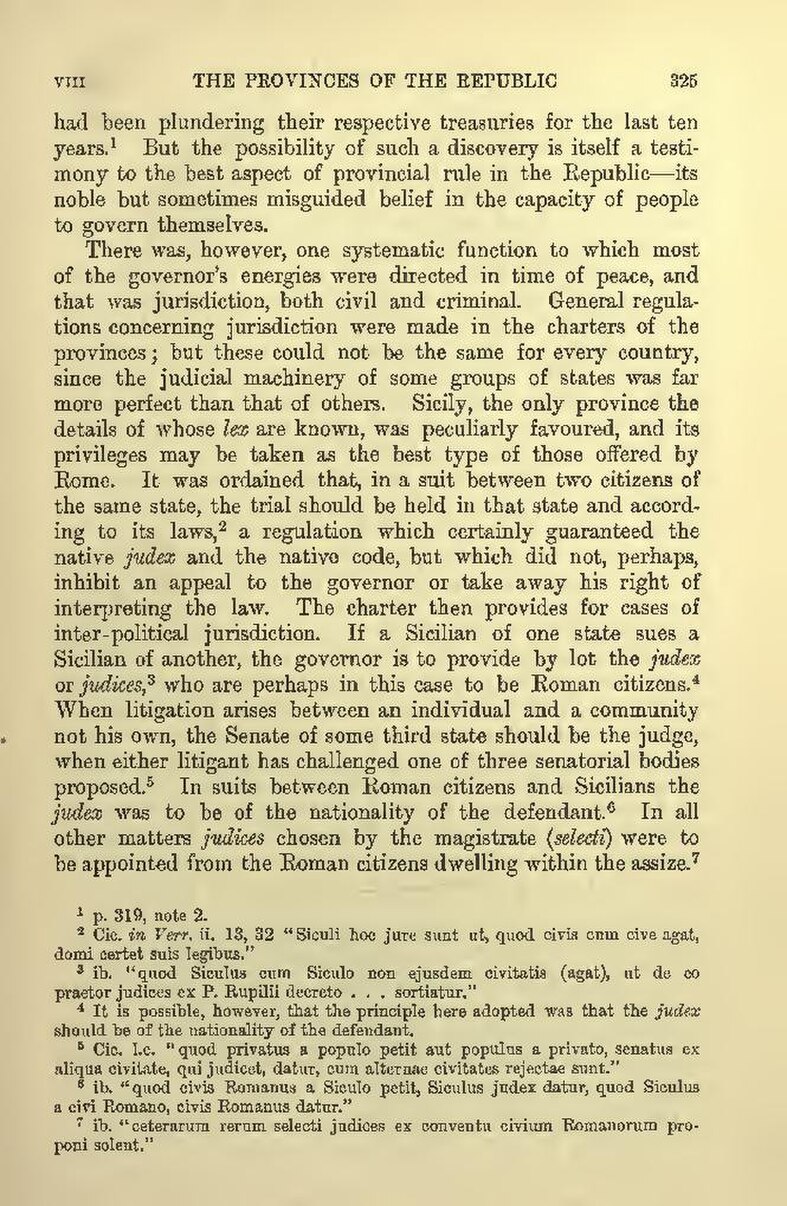had been plundering their respective treasuries for the last ten years.[1] But the possibility of such a discovery is itself a testimony to the best aspect of provincial rule in the Republic—its noble but sometimes misguided belief in the capacity of people to govern themselves.
There was, however, one systematic function to which most of the governor's energies were directed in time of peace, and that was jurisdiction, both civil and criminal. General regulations concerning jurisdiction were made in the charters of the provinces; but these could not be the same for every country, since the judicial machinery of some groups of states was far more perfect than that of others. Sicily, the only province the details of whose lex are known, was peculiarly favoured, and its privileges may be taken as the best type of those offered by Rome. It was ordained that, in a suit between two citizens of the same state, the trial should be held in that state and according to its laws,[2] a regulation which certainly guaranteed the native judex and the native code, but which did not, perhaps, inhibit an appeal to the governor or take away his right of interpreting the law. The charter then provides for cases of inter-political jurisdiction. If a Sicilian of one state sues a Sicilian of another, the governor is to provide by lot the judex or judices,[3] who are perhaps in this case to be Roman citizens.[4] When litigation arises between an individual and a community not his own, the Senate of some third state should be the judge, when either litigant has challenged one of three senatorial bodies proposed.[5] In suits between Roman citizens and Sicilians the judex was to be of the nationality of the defendant.[6] In all other matters judices chosen by the magistrate (selecti) were to be appointed from the Roman citizens dwelling within the assize.[7]
- ↑ p. 319, note 2.
- ↑ Cic. in Verr. ii. 13, 32 "Siculi hoc jure sunt ut, quod civis cum cive agat, domi certet suis legibus."
- ↑ ib. "quod Siculus cum Siculo non ejusdem civitatis (agat), ut de eo praetor judices ex P. Rupilii decreto . . . sortiatur."
- ↑ It is possible, however, that the principle here adopted was that the judex should be of the nationality of the defendant.
- ↑ Cic. l.c. "quod privatus a populo petit aut populus a privato, senatus ex aliqua civitate, qui judicet, datur, cum alternae civitates rejectae sunt."
- ↑ ib. "quod civis Romanus a Siculo petit, Siculus judex datur, quod Siculus a civi Romano, civis Romanus datur."
- ↑ ib. "ceterarum rerum selecti judices ex conventu civium Romanorum proponi solent."
